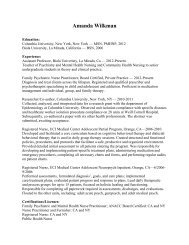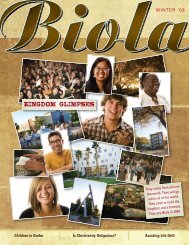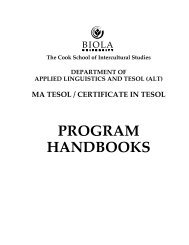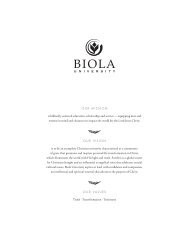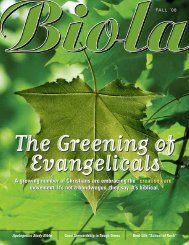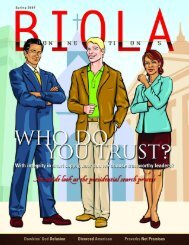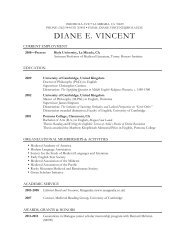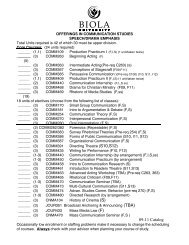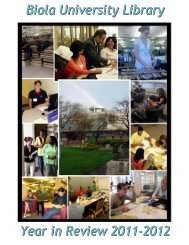Doctor of Missiology - Biola University
Doctor of Missiology - Biola University
Doctor of Missiology - Biola University
Create successful ePaper yourself
Turn your PDF publications into a flip-book with our unique Google optimized e-Paper software.
Cook School <strong>of</strong> Intercultural Studies<br />
Department <strong>of</strong> Intercultural Studies: <strong>Doctor</strong> <strong>of</strong> <strong>Missiology</strong><br />
ACADEMIC INTEGRITY SECTION 2.9<br />
ACADEMIC INTEGRITY<br />
Integrity in academics is extremely important in all educational institutions. In SICS, as a<br />
community <strong>of</strong> Christian scholars, it is even more important that our academic behavior be<br />
characterized by honesty, trustworthiness and adherence to acceptable standards.<br />
There are two kinds <strong>of</strong> academic dishonesty: cheating and plagiarism. Cheating is when you (1)<br />
get or try to get credit for academic work by dishonest or deceptive means; (2) get help on a test by<br />
means <strong>of</strong> notes, aids or other students outside what the instructor has allowed; and/or (3) allow another<br />
student to cheat <strong>of</strong>f <strong>of</strong> your work. Plagiarism is when you represent ideas or words from someone else<br />
as your own by not citing the source.<br />
Plagiarism is an especially challenging issue for international students and non-native speakers <strong>of</strong><br />
English because definitions <strong>of</strong> acceptable and unacceptable behavior may vary from culture to culture.<br />
Culture “A” may say that copying another’s work is “acknowledging the superior mastery and<br />
expression <strong>of</strong> an expert,” while Culture “B” may say that the same behavior is “plagiarism.” This<br />
section <strong>of</strong> the handbook describes the expectations <strong>of</strong> the U.S. academic community regarding<br />
plagiarism.<br />
What Is Plagiarism<br />
Plagiarism is when you use material from a source (book, article, website, lecture, letter, etc.) and<br />
don’t acknowledge where it came from. This is considered disrespectful to the source and is the theft<br />
<strong>of</strong> the author’s intellectual property. It is also considered lying to the people who read what you have<br />
written and who are led to believe that the thoughts are yours. Acknowledging the origin <strong>of</strong> unique<br />
ideas, words and images gives credit to the creator and allows your reader to locate the source. If<br />
English is not your native language, it may be very tempting to copy another’s words. It may also be<br />
difficult to learn to paraphrase and express other’s ideas in your own words. Regardless <strong>of</strong> the<br />
difficulty, however, it is extremely important that you learn how to paraphrase well.<br />
Different Types <strong>of</strong> Plagiarism<br />
1. Handing in someone else’s work as your own. This includes getting papers <strong>of</strong>f the internet and<br />
using another student’s paper or part <strong>of</strong> a paper.<br />
Recommendation: Always do your own work. If you got even an idea from someone else,<br />
acknowledge that person. E.g., the idea <strong>of</strong> a garden as a metaphor for teaching came from Su-<br />
Chu Kim.<br />
Date: June 2005 Page 1 <strong>of</strong> 3



